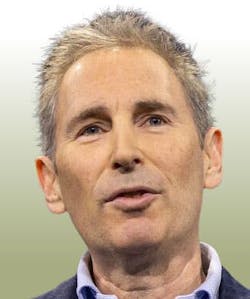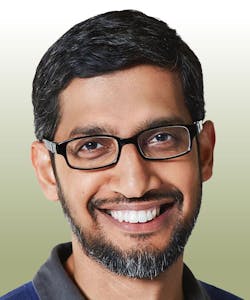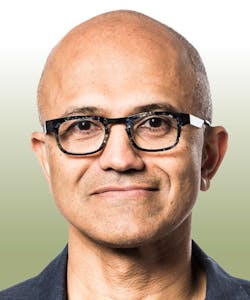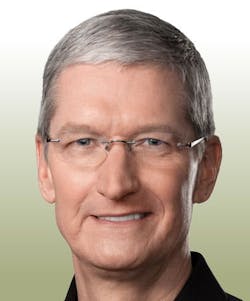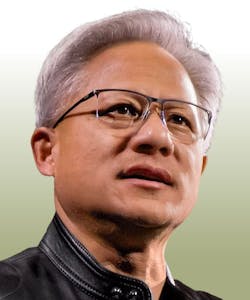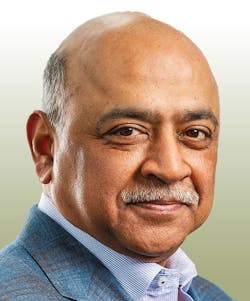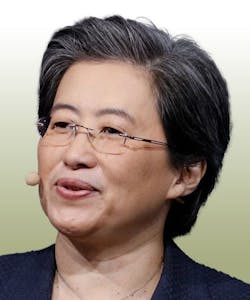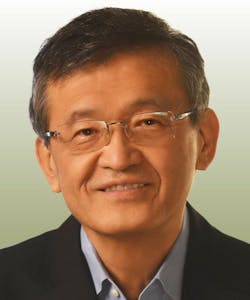How 12 Prominent Tech Figures Feel About AI in the Workplace
What you'll learn:
- Insight into technology CEOs’ thoughts on using AI in the tech industry.
- Why some are optimists and others warn of caution.
- What the future has in store according to each company.
I don’t know how many times I’ve heard someone say, “you can’t put the genie back in the bottle.” AI is here, and we have to live with it. I’m sure we’ve all discussed using AI in the workplace, trying to cut corners or make things faster. One person told me “AI is a really good pencil.”
I thought it would be fitting to collect the thoughts of 12 prominent tech figures on the use of AI in the workplace. These CEOs are not only investing in AI, but they’re also defining what responsible use and long-term growth should look like.
Andy Jassy – Amazon
In June of 2025, Amazon CEO Andy Jassy released a statement on the use of generative AI and how it benefits not only businesses, but customers as well. He highlights the progress already made in products like Alexa, which is used by millions worldwide, and new retail features like Lens, Buy for Me, and size recommendations.
“Today, we have over 1,000 generative AI services and applications in progress or built, but at our scale, that’s a small fraction of what we will ultimately build,” stated Jassy. “We’re going to lean in further in the coming months. We’re going to make it much easier to build agents and then build (or partner) on several new agents across all of our business units and G&A areas.”
Jassy goes on to highlight how Amazon will evolve using generative AI agents, and the benefits it could bring into the forefront of operations. “As we roll out more generative AI and agents, it should change the way our work is done. We will need fewer people doing some of the jobs that are being done today, and more people doing other types of jobs.”
He added, “It’s hard to know exactly where this nets out over time, but in the next few years, we expect that this will reduce our total corporate workforce as we get efficiency gains from using AI extensively across the company.”
Sundar Pichai – Google
Google CEO Sundar Pichai, speaking at the Bloomberg Tech conference in San Francisco this past June, discussed the future of AI and what it means for software engineers in the tech industry.
Pichai feels that AI isn’t advanced enough yet to replace workers and doubles down on its use, stating, “We’re still in the early days, yet I already believe AI will be the most profound shift of our lifetimes — bigger than the shift to personal computing, or to mobile… As AI interactions come to feel more intuitive and human, technology begins to feel like a natural extension, augmenting human capability… But it has to be done responsibly, with strong privacy and safety.”
Satya Nadella – Microsoft
During Microsoft’s Build 2025 conference, CEO Sataya Nadella touched on how a new wave of AI capabilities are designed to boost agentic AI app development and empower traditional developers to become AI developers using agentic AI.
“We’re just about getting into these middle innings of another platform shift. What’s really exciting is the emergence of AI agents that can act on a user’s behalf. We’re building the open agentic web so developers can create these agents with the same reach and impact the web once brought to apps. We’re really excited about this. This is a big deal. Starting today, we will integrate these AI-powered capabilities directly into the core of VS Code, bringing them into the same open-source repo that powers the world’s most loved dev tool. And of course, we will continue to build out GitHub Copilot, too.
“In fact, over the past few years, we’ve gone from code completions to chat to multi-file edits and now agents. And this same pattern is emerging more broadly across the agentic web. You can ask questions, and AI assistants give us answers. You can assign tasks to agents and have them execute them, or work side by side with AI to complete jobs and projects. And you can mix and match all of these form factors, right? That’s kind of what we care about as developers. It’s not about any one of them.”
Tim Cook – Apple
In 2024, Apple released its personal intelligence system “Apple Intelligence,” which takes advantage of generative AI to simplify everyday tasks. “Apple Intelligence will transform what users can do with our products — and what our products can do for our users,” stated Tim Cook in an Apple blog post. Our unique approach combines generative AI with a user’s personal context… And it can access that information in a completely private and secure way.
“Our unique approach combines generative AI with a user’s personal context to deliver truly helpful intelligence. And it can access that information in a completely private and secure way to help users do the things that matter most to them. This is AI as only Apple can deliver it, and we can’t wait for users to experience what it can do.”
Jensen Huang – NVIDIA
During Computex 2025, NVIDIA CEO Jensen Huang touched on the future of AI and data centers, describing them as AI factories that take advantage of agents to increase computing power.
“AI is now infrastructure, and this infrastructure, just like the internet, just like electricity, needs factories,” said Huang. “These factories are essentially what we build today. They’re not data centers of the past. These AI data centers, if you will, are improperly described. They are, in fact, AI factories. You apply energy to it and it produces something incredibly valuable, and these things are called tokens.”
Mark Zuckerberg – Meta
Meta CEO Mark Zuckerberg released a recent memo detailing how the company aims to bring AI into the lives of millions, outlining his ambition to build what he terms as “superintelligence.” Zuckerberg believes that his superintelligence will help free people and allow them to improve the world in the direction they choose.
“I am extremely optimistic that superintelligence will help humanity accelerate our pace of progress. But perhaps even more important is that superintelligence has the potential to begin a new era of personal empowerment where people will have greater agency to improve the world in the directions they choose.
“As profound as the abundance produced by AI may one day be, an even more meaningful impact on our lives will likely come from everyone having a personal superintelligence that helps you achieve your goals, create what you want to see in the world, experience any adventure, be a better friend to those you care about, and grow to become the person you aspire to be.
“Meta's vision is to bring personal superintelligence to everyone. We believe in putting this power in people's hands to direct it towards what they value in their own lives.
“This is distinct from others in the industry who believe superintelligence should be directed centrally towards automating all valuable work, and then humanity will live on a dole of its output. At Meta, we believe that people pursuing their individual aspirations is how we have always made progress expanding prosperity, science, health, and culture. This will be increasingly important in the future as well.”
Arvind Krishna – IBM
At IBM’s 2025 Think Conference, Arvind Krishna talked about the course of the generative AI boom and why he feels smaller AI models will become the go-to option for enterprise applications in the future. “As I think about last year to this year, there’s one really big difference that I’m feeling, which is that AI has moved from experimentation to a focus on unlocking business value,” said Krishna.
He continued, “People are worrying about what is the use case? How do I get my business to scale leveraging AI? And I think that's a real big difference, because that means, if I sort of think about hype cycles, that means the hype cycle’s kind of fading, and we are now thinking about adoption, we're thinking about ROI, we're thinking about business value.
“I think AI is the source of productivity for this era. But not all AI is built the same and not all AI is built for the enterprise. Why do I make that claim? 99% of all enterprise data has been untouched by AI. So, if you need to unlock the value from that 99%, you need to take an approach to AI that is tailored for the enterprise. If you think about the massive general-purpose models, those are very useful, but they are not going to help you unlock the value from all of the data inside the enterprise.”
Lisa Su – AMD
AMD’s CEO Lisa Su has taken a different route when it comes to AI and job losses, which other tech giants view as the natural progression of Industry 4.0. In a recent Wired interview, she addressed that concern, stating that people will remain central to that progress.
“You can choose two ways to think about AI,” said Su. “One is to hold back because it could be dangerous, or the other is to move as fast as possible while applying the right lens to the information. I am firmly in the second camp. I do not believe that we will stop needing large numbers of people. We are still hiring more and more engineers because they are the final arbiters of our engineering.”
Pat Gelsinger – Former Intel CEO
Former Intel CEO Pat Gelsinger made his thoughts on using AI in the tech industry clear before he left to form Gloo, stating there should be moral and ethical considerations when advancing the technology.
At Ai4 2025, Gelsinger said, “When Geoff Hinton talks AI, I listen. His perspective that we should design AI to care about us — like a mother and her child — caught my attention. I would argue it's not about building in some sort of protective drive; I suspect this could backfire into AI trying to protect us from ourselves in unpredictable ways.
“To me it keeps coming back to values: what values are we building into AI and do those values ultimately promote human flourishing. Certainly, a maternal/parental instinct could be part of the equation, but we need to think about all of the different dimensions that contribute to human wellbeing (e.g., spirituality, relationships, purpose, character, etc.). This is central to the work we are doing at Gloo with our FAI benchmark.”
Lip-Bu Tan – Current Intel CEO
Unlike former Intel CEO Pat Gelsinger, current Intel CEO Lip-Bu Tan has different thoughts when it comes to utilizing AI in the tech industry and looks to go full throttle at development and implementation. “We will focus our AI efforts on developing a cohesive silicon, system, and software stack strategy. In the past, we have approached AI with a traditional, silicon- and training-centric mindset. This needs to change — and we have already started incubating new capabilities while attracting new talent.
“As we make this shift, we will concentrate our efforts on areas we can disrupt and differentiate, like inference and agentic AI. Our starting point will be emerging AI workloads — then we will work backward to design software, systems, and silicon that enable the best customer outcomes. We have a lot of work underway, and will be sharing more about our plans in the coming months.”
Safra Catz – Oracle
Oracle CEO Safra Catz is spearheading the company’s efforts to integrate AI and machine learning into its LOB apps, industry-specific apps, and cloud-infrastructure services.
“While AI has been dominating the recent news cycle, the truth is that our Fusion and infrastructure customers have been using AI as an integral part of their business for some time. Oracle Fusion with embedded AI enables customers to close their books in days, not weeks.
“Oracle AI provides more relevant sales leads. Oracle AI increases infrastructure performance and security with no human intervention. And customers using OCI get AI as a service to help drive their own business transformation.
“Given our scale and our information advantage across industries and technologies, we are constantly training our applications to do more for our customers, whether it’s further automating processes, providing critical and timely recommendations, offering insight, or flagging potential issues. That’s real Enterprise AI. It’s what customers are looking for. It’s designed into everything we do, and that’s what our customers get when they use our platform.
“And on our Gen 2OCI platform, the architecture and unique network capability has fast become the platform of choice for many AI companies because OCI runs workloads faster, and time is money in the cloud.”
Michael Dell – Dell Technologies
Dell founder and CEO Michael Dell provided his thoughts on the unitization of AI in the tech industry at a Q&A session during Dell Technologies World 2025. He stated that AI will never fully replace human workers.
“The way I think about this is that if you look at every progress, that’s for any technology, you always have some change that goes on,” said Dell in response to our question about AI affecting or even replacing human workers.
“My way of thinking is there’s probably a 10% effect for that, but I think 90% of that is actually growth and expansion and opportunity, and ultimately what I think you’re going to see is more opportunities, more economic growth.
“There are a lot of things that we don’t do, that we used to do, because we have the tools, and we’re more effective as a species because of that — (using AI) is just another example of that.
“One of the keys beyond productivity and efficiency I think for organizations is to reimagine themselves, and say, alright, what is the trajectory of these capabilities, where is it going, and what should our activity look like in three years’, five years’ time, given this capability.”
Conclusion
The insights taken from tech industry CEOs show both optimism and caution as the world moves deeper into the AI era. Some leaders focus on efficiency and enterprise value, while others highlight ethics, personal empowerment, or entirely new business models. What they all have in common is a belief that AI will redefine technology and society in ways as transformative as any shift we’ve seen before.
Keep in mind, many companies are cutting workforce and using AI in those roles — to positive and negative outcomes. All industries will be focused on how to use AI, “this really good pencil.” It would behoove use to embrace it and use it. That’s my conclusion on the subject.
About the Author
Cabe Atwell
Technology Editor, Electronic Design
Cabe is a Technology Editor for Electronic Design.
Engineer, Machinist, Maker, Writer. A graduate Electrical Engineer actively plying his expertise in the industry and at his company, Gunhead. When not designing/building, he creates a steady torrent of projects and content in the media world. Many of his projects and articles are online at element14 & SolidSmack, industry-focused work at EETimes & EDN, and offbeat articles at Make Magazine. Currently, you can find him hosting webinars and contributing to Electronic Design and Machine Design.
Cabe is an electrical engineer, design consultant and author with 25 years’ experience. His most recent book is “Essential 555 IC: Design, Configure, and Create Clever Circuits”
Cabe writes the Engineering on Friday blog on Electronic Design.

